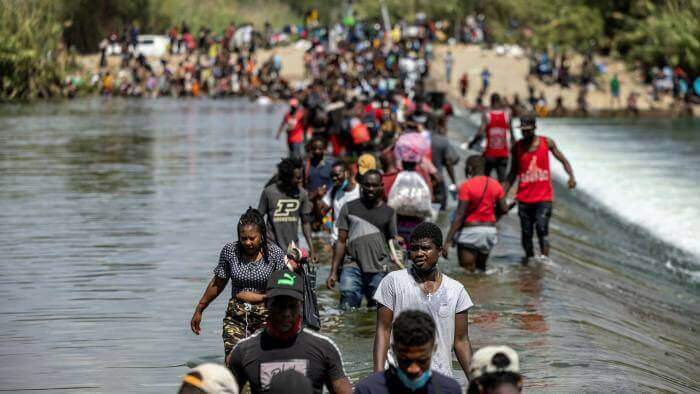United States (US) border agents have begun removing thousands of Haitian migrants who occupied a large makeshift camp in Del Rio near the Texas-Mexico border.
The US officials plan to expel nearly 12,000 migrants camped in Del Rio in the coming days. The first flight carrying over 320 migrants arrived in Haiti’s capital Port-au-Prince on Sunday, and six more flights are expected to arrive by Tuesday, concluding the expulsion process.
Refusing to return to Haiti, the migrants have camped underneath the Del Rio International Bridge. “We are working around the clock to expeditiously move migrants out of the heat, elements and from underneath this bridge to our processing facilities to quickly process and remove individuals from the United States consistent with our laws and our policies,” Border Patrol Chief Raul L Ortiz said.
The US has announced that it would accelerate the deportation by increasing the number of “removal flights.” The Department of Homeland Security (DHS) stated that it was working with nations where the migrants began their journeys, such as Brazil and Chile. “We have no choice at this point but to increase repatriation flights,” DHS Chief Alejandro Mayorkas said, adding that the flights would take migrants either to Haiti or possibly other countries. “We have reiterated that our borders are not open, and people should not make the dangerous journey,” he told Reuters.
The US administration plans to permanently restrict “irregular” migrants from Haiti and others passing through the Mexican border.
After taking office in January, President Joe Biden attempted to install a more “humane” approach towards international migrants seeking asylum in his country, unlike his predecessor Donald Trump’s anti-migrant policy. Despite the existence of Title 42, introduced in March 2020, an order that necessitates all migrants seeking asylum in the US to be expelled in light of the pandemic, Biden allowed several migrants to stay back, exempting unaccompanied children and many families.
The Biden administration also extended temporary deportation relief to around 150,000 Haitians within the US earlier this year. However, the surge of migrants gradually increased over the last two years, creating an “unmanageable chaos” in Del Rio and compelling Biden to retain the effects of Title 42.
Meanwhile, migration advocates, human rights activists, and public health experts have strongly criticised the US’ decision, referring to Haiti as a “burning house”– unsafe and unlivable for the scores of migrants.
Haitian migrants have also protested against the US’ plan to send them back to their native country, arguing that “Haiti is mired in a deep political and humanitarian crisis and does not have the means to receive thousands of homeless deportees.” Several migrants intend to stay back in Del Rio, considering the current volatile situation in Haiti, which recently suffered a fatal 7.2 magnitude earthquake and the controversial assassination of former President Jovenel Moïse that led to political turmoil.
The US’ decision to expel Haitians in such a scenario has triggered dismay in Haitians who fled politico-economic violence and imbalance plaguing their homeland. “In Haiti, there is no security. The country is in a political crisis,” Fabricio Jean, a 38-year-old Haitian who arrived with his wife and two daughters, told the Associated Press.
Moreover, the head of Haiti’s national migration office, Jean Negot Bonheur Delva, said, “The Haitian state is not capable of receiving these deportees.” He highlighted that Haiti is currently tackling the severely damaging effects of the earthquake and the COVID-19 pandemic. “I am asking for a humanitarian moratorium. The situation is very difficult,” he said, urging the US to terminate the expulsions.
However, Haitian Prime Minister (PM) Ariel Henry said “arrangements have already been made” to receive those returned to the Caribbean nation.
“Will we have all that logistics? Will we have enough to feed these people?” Delva asked the PM.
US Begins Mass Deportation of Thousands of Haitian Migrants in Texas
United States launched mass expulsions of around 12,000 Haitian migrants along the Texas-Mexico border. The first flight arrived in Haiti on Sunday an six more are expected to arrive by Tuesday.
September 20, 2021

Haitian migrants cross the Rio Grande near a temporary migrant camp under the international bridge on Saturday in Del Rio, Texas. SOURCE: JORDAN VONDEHEER/GETTY IMAGES
